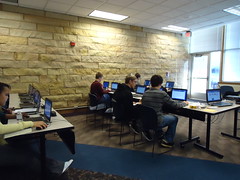 In England we have a weekly soap set in a school called Waterloo Road. This has everything you would hope not to find in a school: inappropriate behaviour, theft, even attempted murder – and that’s just the staff. The kids are pretty OK by comparison: teenaged pregnancy, illegal drug-taking and gangs. Strangely enough, there doesn’t seem to be more than 30 kids on roll, judging by the number of people who attend whole-school assemblies. But my main interest is this: what (good) use of technology is shown in this programme?
In England we have a weekly soap set in a school called Waterloo Road. This has everything you would hope not to find in a school: inappropriate behaviour, theft, even attempted murder – and that’s just the staff. The kids are pretty OK by comparison: teenaged pregnancy, illegal drug-taking and gangs. Strangely enough, there doesn’t seem to be more than 30 kids on roll, judging by the number of people who attend whole-school assemblies. But my main interest is this: what (good) use of technology is shown in this programme?
Learning with Technology – What the Research says
3D and haptics in education
 Unless you’ve been walking around with a bucket over your head for the past year or three, you must have noticed that 3D is definitely the “in” thing. It’s almost de rigueur for new movies to be in 3D, and there is even at least one smartphone which has a 3D display. But what about educational applications?
Unless you’ve been walking around with a bucket over your head for the past year or three, you must have noticed that 3D is definitely the “in” thing. It’s almost de rigueur for new movies to be in 3D, and there is even at least one smartphone which has a 3D display. But what about educational applications?
The 3D Landscape
 Recent changes in the 3D technology landscape are transforming the way we visualise and interact with 3D data and the real world. 3D applications and technologies have reached a level of maturity that are starting to add a real value to the education sector. Inition brings over 10 years experience of integrating 3D technologies alongside expert consulting and training services. We asked them to outline a few of their examples, from 3D displays through to scanning, 3D printing, motion capture and haptic interfaces.
Recent changes in the 3D technology landscape are transforming the way we visualise and interact with 3D data and the real world. 3D applications and technologies have reached a level of maturity that are starting to add a real value to the education sector. Inition brings over 10 years experience of integrating 3D technologies alongside expert consulting and training services. We asked them to outline a few of their examples, from 3D displays through to scanning, 3D printing, motion capture and haptic interfaces.
The effective use of ICT
ICT gets all touchy-feely
Is educational technology only about keyboards and other familiar input devices? Actually, no! There’s a lot of cutting-edge work going on in the realm of haptics.
Professor Margaret Cox explains what haptics is:
EDUsummIT 2011 Report: The Digital Divide
UNESCO EDUSummIT2011: Brief update
#edusum11 The conference is now in its final hour or so, with brief addresses from an international panel followed by "Next steps".
I started to write a blog post earlier, but realised very quickly that I need to do more reflecting. It's been a very rich experience in some respects, and I need to assimilate what I think I may have learnt. I've had the opportunity to meet with some of the organisers, representatives of Ministries of Education and researchers.
You can follow the conference on Twitter, using the hashtag given above. There will be video podcasts later (I'm told Monday).
More soon.
- Posted using BlogPress from my iPad
EduSummIT Conference (UNESCO) News
#edusum11 Should anyone invite you to contribute to a handbook, don't turn it down. A few years ago, a handbok was put together (http://edusummit.nl/handbook), which led to several working group-type events, which led to an "EduSummIT" in 2009, which led to EduSummIT 2011.
With over 120 delegates from 40 countries, this promises to be a very interesting -- and useful -- event. Delegates have been allocated to working groups -- mine is 21st century skills. I hope to be reporting on this over the next few days, as long as the wi-fi, my iPad keyboard and my level of wakefulness hold out (the hotel fire alarm went off at around 1 am, which is no joke!)
Look for #edusum11 on Twitter, and edusummit2011 on the web and in Flickr. The conference website is http://edusummit.nl/, where you can find further information. You might also like to check out the latest edition of my newsletter (go to www.ictineducation.org/newsletter and scroll down), as it has a link to a very interesting recent report from UNESCO.
OK, that's it from me for now: I love blogging and writing in general, but sleep also has its attractions!
- Posted using BlogPress from my iPad
The evolution of research
This is the subtitle of an exhibition at the British Library. Called “Growing Knowledge”, the exhibition seeks to answer the following questions:
- How have digital technologies changed research?
- What are the new challenges they pose?
- What role should a research library play in the 21st Century?
The importance of research for ICT teachers revisited
The importance of research for ICT teachers
The biological implications of social networking
Learning Platforms: 2 Resources and a Conference
Search engines with a difference: Collecta
Creating a game – a positive impact on learning?
Battling the barriers of games-based learning
 Pupils tend to want games that look fun and will not consider the educational aspect; teachers tend to want a very structured approach that compliments the vision of the subject they are delivering. Trying to deliver content we think suits both the learner and the teacher has been a difficult challenge.
Pupils tend to want games that look fun and will not consider the educational aspect; teachers tend to want a very structured approach that compliments the vision of the subject they are delivering. Trying to deliver content we think suits both the learner and the teacher has been a difficult challenge.
C? I tld u so, didn't I? txtN isn't so bad aftr ll, unl ur /:-)
 When, a few years ago, a 13 year-old girl wrote her entire English essay in texting language, people were predicting the end of civilisation as we know it. Now it turns out that research seems to suggest that texting can actually aid literacy. So where does the truth lie?
When, a few years ago, a 13 year-old girl wrote her entire English essay in texting language, people were predicting the end of civilisation as we know it. Now it turns out that research seems to suggest that texting can actually aid literacy. So where does the truth lie?
Is ICT in Schools Damaging to the UK’s Economic Health?
 This is the gist of the question posed by the Royal Society, which, as promised in a previous article, has just launched a call for evidence.
This is the gist of the question posed by the Royal Society, which, as promised in a previous article, has just launched a call for evidence.
Why Do You Blog?
In Why I Write, George Orwell suggests the following reasons that someone may wish to write:
- To make money.
- Egoism, eg a desire to appear clever, or to be remembered after your death.
- Aesthetic enthusiasm, eg a love of words for their own sake.
- Historical impulse, ie a desire to see things as they really are, so that posterity my benefit.
- Political (with a small ‘p’), ie to influence other people’s ideas about society.
I’d also add another two:
Educational, ie the desire to give others the benefit of the knowledge you’ve acquired – which I suppose could also come under the heading of egoism, or even political.
Record-keeping, be that as a diary, a research record, or another kind of journal.
So I am wondering if these categories might be applied to blogging? Why do people blog? I’ve set up a very simple, and no doubt simplistic, poll to find out. I know the categories are subtle and overlap and interface with each other. Nevertheless, my poll comprises just one question:
What is your number one reason for blogging?
Do take part, and feel free to add reasons of your own on the ‘Other’ category. Let’s see what transpires.

